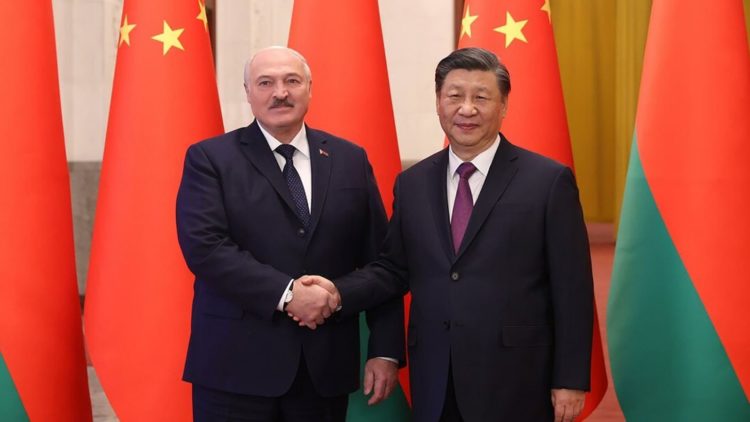At the gathering, Xi called on “concerned nations” to abandon the notion of employing the global economy politically and to take action to allow for the peaceful resolution of the conflict. This is presumed to be an allusion to the United States and its associates.
In the joint statement, Minsk and Beijing agreed in their resistance to what they characterize as a Western-led international system, expressing disapproval of “any forms of hegemony and power politics, such as using illegitimate unilateral sanctions and limiting measures against countries.”
Beijing and Minsk, which had Western sanctions imposed on them due to Russia’s aggressive actions, will also expand their economic partnership, according to the announcement. In addition, the sides vowed to augment their collaboration in the areas of military personnel training, combating terrorism, and averting what autocrats dub “color revolution” – which is an allusion to pro-democracy drives that some in the West are said to back.
A recent report has shown that the US and China have a difficult time regarding their relations, especially regarding Ukraine and the Covid-19 pandemic. Both countries need to come to an agreement on many matters. This has caused a strain on their diplomatic relations.
Blinken’s recent admonition to Beijing is a noticeable symptom of the US-China ties deteriorating.
A shift in relations between the US and China has been observed due to the situation in Ukraine and the COVID-19 pandemic. This alteration has caused a distinct change in the two countries ties and has impacted global geopolitics.
Strained Relations with the West
The tension between the West and other nations has been a cause of concern for many countries. This has led to a strained relationship in the international arena.
Chinese state media reported that the meeting between the two leaders was “warm and friendly,” which was the initial face-to-face since the relationship between them was elevated to an “all-weather comprehensive strategic partnership” during the SCO summit in Uzbekistan last September, which Putin attended.
President Xi met with Belarusian President Lukashenko on his state visit to China.
The two leaders signed a joint statement on the further growth of China-Belarus all-weather comprehensive strategic partnership in a new era. pic.twitter.com/0CKgcAHirJ— Hua Chunying 华春莹 (@SpokespersonCHN) March 1, 2023
At the meeting, President Xi Jinping expressed his assurance that the friendly exchanges between China and Belarus will remain strong and that Belarus will become a full member of the Shanghai Cooperation Organization (SCO). He also stated that the two countries would agree on new plans for advancing their bilateral ties. This information was reported by Chinese state media.
On the same day, Secretary of State Antony Blinken commented from Uzbekistan, a member of the SCO, noting that China cannot “have the best of both worlds” in the current situation, whereby it presents itself as a “peaceful force” but keeps adding to the “escalating conflict which .” Vladimir Putin set off
Blinken stated that while there are “some favorable aspects” of China’s peace plan, they do not support peace in Ukraine, as they are “actively engaging in activities to help spread Russian propaganda and deceit regarding the war.”
He reiterated worries of the West that Beijing is looking into supplying Russia with lethal weaponry and then noted that he had no intention to have a meeting with either Russian or Chinese delegates at the upcoming G20 gathering of foreign ministers, which will take place in New Delhi, India on March 2.
Alexander Lukashenko expressed total backing for China’s latest security initiative that had been made public, which featured a 12-point plan in reaction to Russia’s invasion of Ukraine.
The relationship between Minsk and Beijing deepened after a prolonged drop in Belarus’ association with the Western world.
In reaction to Russian forces entering Ukraine along the 1,000-kilometer (621-mile) Ukrainian-Belarusian border situated north of Kyiv, which President Lukashenko had sanctioned, the US and its allies it has imposed restrictive measures against the erstwhile Soviet state.
The EU has yet to validate the success of Lukashenko in the 2020 elections, which have caused popular uprisings in the country and been met by an oppressive governmental response. The US has also named the election “untrustworthy.”
The meeting between Lukashenko and Xi Jinping lasted 4 hours.
The heads of Belarus and China signed a joint declaration on the basic principles of the development of a "comprehensive strategic partnership. pic.twitter.com/eQPt6bId6M— ਟੋਮੈ ਬਾਆ 🇵🇬 (@aMePrGQX3dSE6TX) March 1, 2023
Concerns have persisted throughout the Ukraine struggle that Belarus could become a launching pad for a new Russian strike or that Lukashenko’s forces could join the war. Before his journey to Moscow a couple of weeks ago, Lukashenko declared that his nation would not dispatch troops to Ukraine unless it were assaulted.
Belarus, like China, has suggested that the US wants to prevent the dispute from concluding.
Prior to his trip to Moscow to meet with Putin, Lukashenko told reporters that he sought to achieve “peaceful negotiations” and blamed the United States for obstructing Zelensky, the Ukrainian President, from trying to negotiate.
“The US are the only ones who need this slaughter, only they want it,” he said.
Martin Goillandeau, Wayne Cheng, and Sandi Sidhu provided reporting for the Beijing bureau of CNN.










COMMENTS